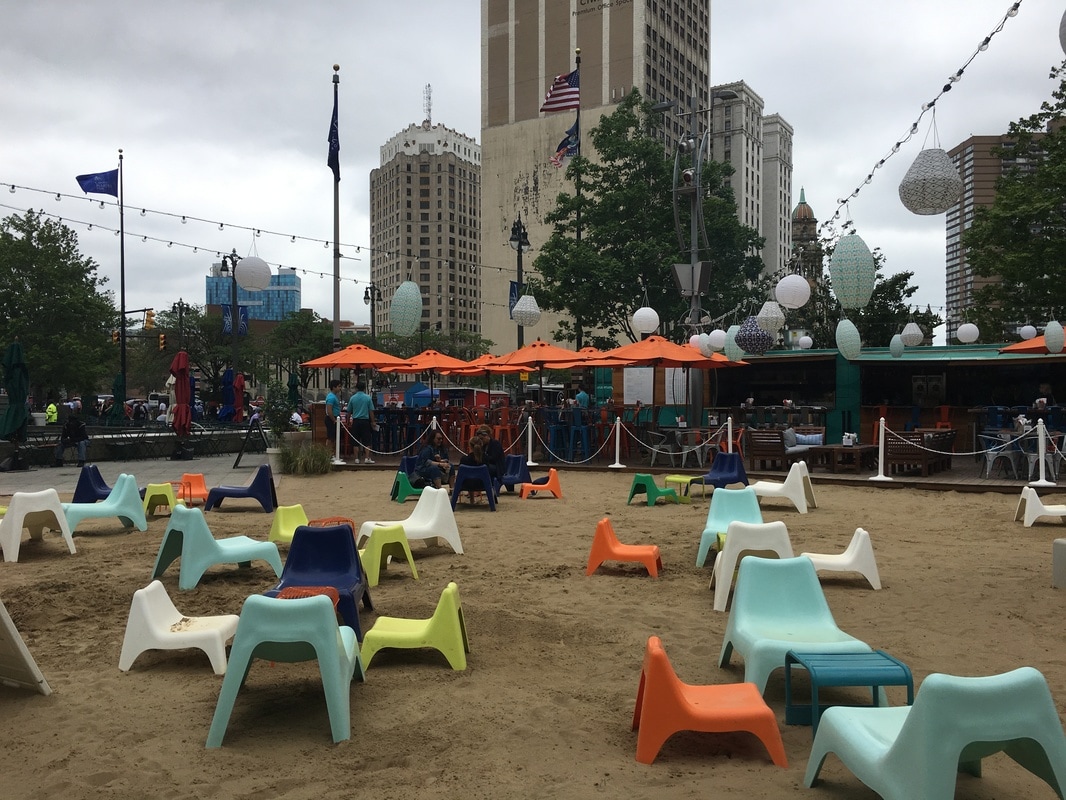
I have been pleasantly surprised by the energy that buzzes around town, the beauty and contrast between the old buildings covered with vibrant murals, and, of course, the people who love to love Detroit. I’ve found that just beyond each turn, lies something different, new, and exciting. From discovering a mini-beach in the middle of the city, to making meaning of the array of seemingly random items at the Heidelberg Project, I have been forced to constantly question how a city with such diversity, energy, hope, and struggle can have so much pride, on nationalistic level. To me, I get the sense that each Detroit resident is excited about Detroit: the people, place, events, melting-pot culture, energy, change, and excitement each day brings.
I am interested in the ways in which Detroit has slowly become a more 21st-century city. I have seen the ways in which it has progressed into what millennials would call a “trendy,” “hipster,” “chill,” city; from the quirky shops with funky items, to the cozy coffee shops that each have their own take on the world, and to the juice, salad, and yoga shops that cover many square miles of midtown and downtown, Detroit is slowly but surely becoming like other “cool” big cities. However, after our visit to the Ford Rouge factory, I was able to take a step back and recognize how Detroit really still is, in part, stuck in the past. Factory workers on who are on their feet, doing the same task each day, the production of Ford F150’s—a gas-guzzling, environment-trashing car, and the mass, seemingly endless production of these vehicles with very little care for environmental impact and damage, Detroit has really failed in this way to modernize and move away from the car industry, one that has been, and probably always will be, central to life here. I am by no means saying that Detroit should move away from car production, but I do think that there are ways to be more conscious about the ways in which both our earth and people of our earth and used in car production, as well as the uses the cars themselves go to, and the damage most cars do to our planet.
I hope to connect people who seem to be struggling, and who seem to be on the outskirts of the change that is occurring in Detroit, into the modern world through connecting them to opportunities for individual, family, and community success and development. At ProsperUS, I want to inspire and help minority, impoverished, and refugee potential entrepreneurs learn about economics opportunities for success. I want people who have business ideas, whether they know it or not, to have the opportunity to explore and try to fulfill the “American Dream,” as well as helping to dispel their fears about money-lending and running a small business. I want to show people that Detroit isn’t just moving into a world that young, white, millennials want; it’s moving in a sustainable direction filled with hope that is tied to the ability to prosper.
I am interested in the ways in which Detroit has slowly become a more 21st-century city. I have seen the ways in which it has progressed into what millennials would call a “trendy,” “hipster,” “chill,” city; from the quirky shops with funky items, to the cozy coffee shops that each have their own take on the world, and to the juice, salad, and yoga shops that cover many square miles of midtown and downtown, Detroit is slowly but surely becoming like other “cool” big cities. However, after our visit to the Ford Rouge factory, I was able to take a step back and recognize how Detroit really still is, in part, stuck in the past. Factory workers on who are on their feet, doing the same task each day, the production of Ford F150’s—a gas-guzzling, environment-trashing car, and the mass, seemingly endless production of these vehicles with very little care for environmental impact and damage, Detroit has really failed in this way to modernize and move away from the car industry, one that has been, and probably always will be, central to life here. I am by no means saying that Detroit should move away from car production, but I do think that there are ways to be more conscious about the ways in which both our earth and people of our earth and used in car production, as well as the uses the cars themselves go to, and the damage most cars do to our planet.
I hope to connect people who seem to be struggling, and who seem to be on the outskirts of the change that is occurring in Detroit, into the modern world through connecting them to opportunities for individual, family, and community success and development. At ProsperUS, I want to inspire and help minority, impoverished, and refugee potential entrepreneurs learn about economics opportunities for success. I want people who have business ideas, whether they know it or not, to have the opportunity to explore and try to fulfill the “American Dream,” as well as helping to dispel their fears about money-lending and running a small business. I want to show people that Detroit isn’t just moving into a world that young, white, millennials want; it’s moving in a sustainable direction filled with hope that is tied to the ability to prosper.
 RSS Feed
RSS Feed
